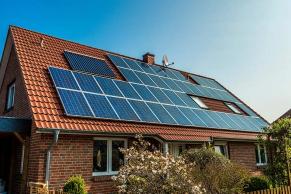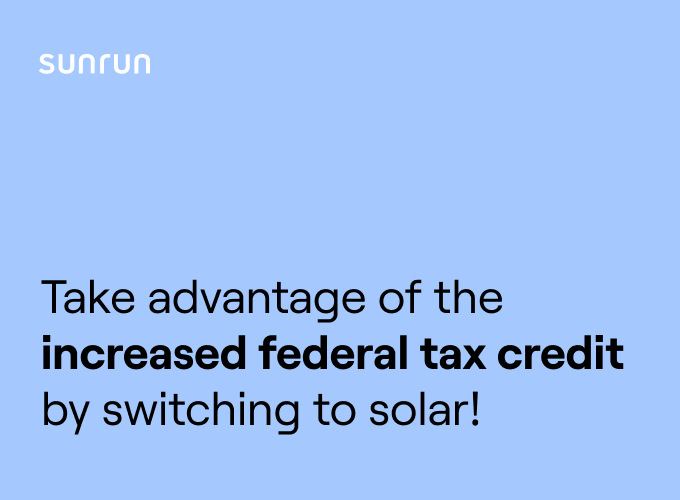The Best Ways to Maximize Solar Panel Efficiency
Sunrun Team
· 5Energy efficiency is an important factor to consider as you shop for home solar panels

Energy efficiency is an important factor to consider as you shop for home solar panels, but what does energy efficiency mean? We’re here to help you make sense of solar panel efficiency, and we’ll help you maximize it so you can get the most out of your home solar system.
Want an industry-leading solar system for as little as $0 down? Schedule a solar consultation with one of our expert Solar Advisors today.
How Efficient Are Solar Panels?
To determine solar panel efficiency, sometimes referred to as photovoltaic conversion efficiency, we measure how much energy from sunlight is transformed into electricity.1 The average commercial solar panel converts 17-20% of sunlight into electricity.2 While 20% might not sound like a lot, it’s enough to keep the average American home powered throughout the day. Even the best semiconductors only capture a fraction of the light that strikes them.3 Much of the light that strikes solar panels is reflected back, passes through the panel, or is converted into heat instead of electricity.3 That’s why the residential solar panels you often see appear dark blue or black.4 These “anti-reflection” coatings ensure the solar panels absorb as much sunlight as possible to maximize efficiency.4
Do Solar Panels Degrade over Time?
As with most technologies, solar panels will naturally produce less energy over time. This reduced power output is called the degradation rate. The median solar panel degradation rate is about 0.5%, which simply means that a solar panel’s energy production will decrease at a rate of 0.5% per year.5 After 20 years, your panels should still be working at about 90% of its original output.
While solar systems typically last upwards of 20 years, repairing and replacing a solar energy system can come at a high cost.6When you lease a solar system with Sunrun, all you have to do is pay for the power—we’ll take care of the rest. Our solar lease includes free system monitoring, maintenance, and repairs so you can enjoy 25 years of worry-free, clean energy.
How Does Weather Affect Solar Panel Efficiency?
Even in below-freezing weather, solar panels turn sunlight into electricity. That’s because solar panels absorb energy from our sun’s abundant light, and not from the sun’s heat. In fact, cold climates are actually optimal for solar panel efficiency.7 As long as sunlight is hitting a solar panel, it will generate electricity. Less output during the winter months will primarily be due to shorter daylight hours, or possibly heavy snow.
This doesn’t mean that solar panel output will decrease in warmer weather; any diminished efficiency is balanced out thanks to more daylight hours during the spring and summer months.7
Do Solar Panels Work in Rain and Snow?
If your winters look cloudy, rainy, snowy, or all of the above, not to worry. Solar panels can still generate electricity under these conditions, too. While solar panels are most productive in direct sunlight, they can still use diffuse or indirect sunlight (radiation) to generate energy.8
Even though energy production decreases with increasingly dense cloud cover, panels continue working to a greater capacity than one may expect. Rain also helps wash away dust on panels to keep them operating efficiently.9
During times of heavy snow accumulation, solar panels’ dark, reflective glass accelerates snow melt so that it slides off before it can hamper performance. Rooftop solar panels are also typically tilted up at 30 to 45 degrees, which keeps snow from accumulating, but only to a point.11 In comparison, a light dusting of snow is likely to blow off or disappear rapidly.
In fact, on cold, clear days, snow from the ground can reflect extra sunlight onto your solar panels like a mirror. This “albedo effect” enables panels to produce even more electricity in the cold.10
If your panels require more than a routine hosing down or require you to get on the roof, we highly urge you to contact a trusted solar provider to receive professional assistance.
Three Tips on Maintaining Solar Panel Efficiency
While solar panels generally require little maintenance, it’s still important to inspect your solar panels from time to time and monitor their performance. Here are a few tips to ensure your solar installation is working at its full capacity:12
-
Keep your panels clear of debris and other damaging materials.
While rain is generally sufficient to keep your panels clean, you may want to consider a professional cleaning if you ever notice your panels aren’t working at their full capacity.
-
Make sure your panels are regularly monitored and maintained.
If your solar panels underperform after a rainfall or being hosed down with water, or if you see an unusual spike in your utility bill, it may point to an electrical problem that needs to be addressed by a professional.
-
Team up with a trustworthy solar company.
The best thing you can do to ensure your solar system’s longevity is to find a reputable solar installer. Although solar systems require little regular maintenance, some solar providers offer comprehensive maintenance packages for the life of their products to ensure they efficiently continue to generate clean, affordable, and reliable energy for decades.
Sunrun has over 14 years of installation experience and partners with only the most highly-trained solar installers in your neighborhood to provide you with worry-free solar power.
Energy Efficiency vs. Cost Efficiency
While solar panel efficiency is important to consider, cost efficiency will likely be the most relevant factor in your search for a home solar panel system. Sunrun ensures you have a cost-efficient system in three ways:
-
We only recommend solar if it has the potential to save you money.
Sunrun will help you determine whether a solar panel system has the potential to cut the cost of your current electricity rates. Our easy-to-use Product Selector will ask you for your average monthly electricity bill so our Solar Advisors can determine if solar makes financial sense for you. -
Lock in predictable rates for as little as $0 down.
Sunrun’s monthly solar plan, also known as a solar lease, allows you to go solar for little to nothing out of pocket. You’ll lock in a low rate for 25 years, which offers additional peace of mind as utility bills continue to rise.13 We even provide you with the option to prepay the lease in full with just one up-front payment.
Our solar lease is also backed by our industry-leading Solar Guarantee, which includes 24/7 monitoring and maintenance, as well as full insurance coverage. When you choose a solar lease, you’ll have control over your energy bills. We take care of the rest.
-
Offset peak electricity rates with a solar battery.
Solar panels paired with battery storage can help buffer you from peak electric rates. For states with Time-of-Use or TOU rates, going solar with a home battery allows you to run your appliances when you want, and not when electric companies tell you to. Excess energy is stored in your home battery, and you can use it when you need it the most while further optimizing your energy savings.
Renewable Energy and Efficient Solar Panels for Your Energy Needs
A reputable residential solar company will guarantee reliable solar panel production and dependable customer service for decades to come. With over 20 years of experience, Sunrun is committed to creating a clean energy future for all.
See why over 600,000 Americans across the country have partnered with Sunrun and get a solar consultation today. You can also use our easy Product Selector to get a solar system that’s custom-fit to meet your needs.
- 1. Photovoltaic Energy Factsheet
- 2. Solar Energy Optics: expanding efficiency
- 3. Solar panels are more efficient than you’ve heard. This material could make them even better.
- 4. Solar Performance and Efficiency
- 5. Lifetime of PV Panels
- 6. How Much Do Solar Panels Cost?
- 7. How Does Temperature Affect Solar Panels?
- 8. Direct, Diffuse and Reflected Radiation
- 9. Just a spoonful of solar panel cleaning, helps the revenue go up – the revenue go up!
- 10. Solar Panels Work Great In Snowy Regions, Research Shows
- 11. Let it Snow: How Solar Panels Can Thrive in Winter Weather
- 12. How Much Does It Cost To Clean And Maintain Solar Panels?
- 13. Short-term Energy Outlook

See if you qualify for the
26% federal tax credit
Thanks so much! We'll call you shortly.
Sorry, we are not taking new customers in your area yet
Refer a friend. Get $1000